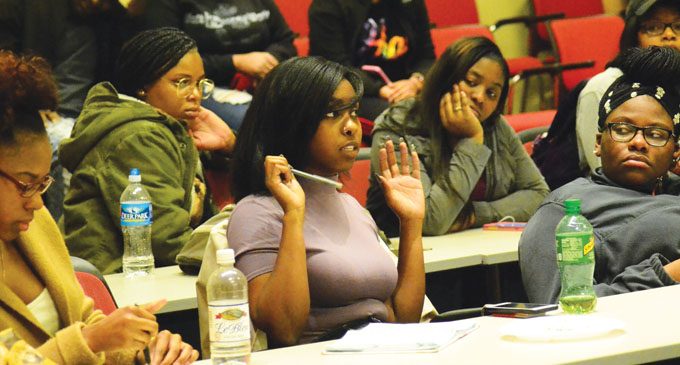‘13th’ sparks powerful conversation at WSSU
Senior political science major Mona Zahir makes a point on the mass incarceration of African-Americans on Tuesday, Jan. 31.

Photo by Tevin Stinson
BY TEVIN STINSON
THE CHRONICLE
Technically, slavery in the United States ended well over 100 years ago, but, if you look at the prison population and the number of African-Americans still in chains, it’s easy to see that slavery has just taken on a different form.
In her new Netflix original film “13th,” Ava DuVernay who also directed “Selma,” takes a closer look at the amendment that freed slaves and the link it has to the modern prison system. Last week, Winston-Salem State University (WSSU) and the Alliance for Sustainable Communities invited the community to take a closer look as well when they held a screening of the documentary on campus.
The 13th Amendment, which was ratified in 1865, reads, “Neither slavery nor involuntary servitude, except as a punishment for crime whereof the party shall have been duly convicted, shall exist within the United States, or any place subject to their jurisdiction.”
In the 2016 documentary, DuVernay uses historical facts and interviews with scholars and activist to track the criminalization of African-Americans from the end of the Civil Rights Movement to the Black Lives Matter movement of today.
As they watched the film, students, professors and members of the greater Winston-Salem/Forsyth County community cringed in disbelief when they read that one in four African-American males will serve prison time at one point or another in their lives. Following the film, those in attendance had the opportunity to voice their frustrations, and have thoughtful conversations on how to move forward.
Senior Jaylon Herbin got the conversation going when he asked where do you see African-Americans in the next 25? WSSU social justice professor Dr. Jack Monell said it is up to the students to stand up, demand change and stay active in the fight.
“You guys ultimately are the next generation. That’s why you’re here,” he continued. “It’s our jobs as professors to provide you with the knowledge to bring about change because knowledge is power. As you guys are studying, you have to feel empowered and ready to make change on the issues that impact all of us.”
Co-chair of the justice studies department, Dr. Denise Nation, said to bring about real change, the African-American community must first cancel out the “white noise” that tells us that we are the problem. Nation said the idea that our communities are the problem was perpetrated against us and it’s important that we recognize that.
“We always hear about this idea of black-on-black crime. That’s always the fall back argument, but all of that is just white noise,” she continued. “We have to see the bigger picture; now we’re blaming each other and turning on each other.
“Our focus has to be to stay together. They have whitewashed the history books so we don’t know our history so we have to teach our history.” she said.
After watching the documentary for the first time, and listening to the students and professors converse, community activist and local business owner Jerry Anderson said he was excited to see so many students concerned about the future of the African-American community. Anderson also echoed Nation’s sentiments on working together.
He said, “If we have a loud enough voice to the relevant people, I believe we could really make a difference. We can bring jobs to our communities so that our people are not being locked up like slaves. I believe we can move forward from the wreckage of our past.”












